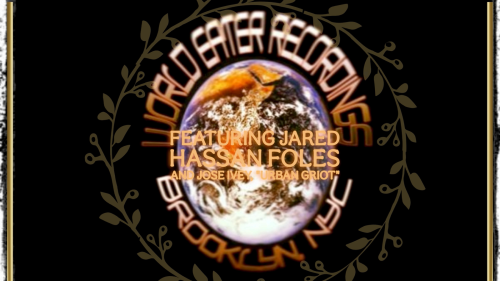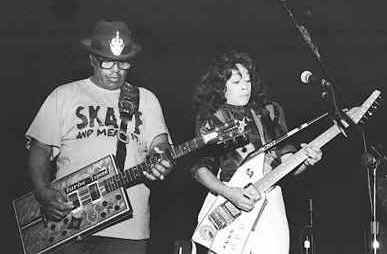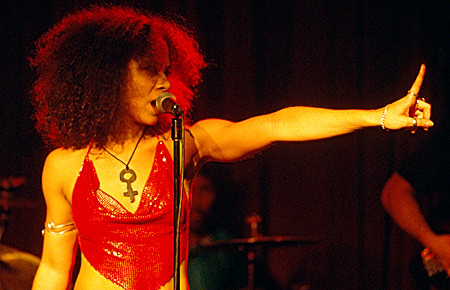

Alexandria, VA/New York City (4-12-24)
Nicole Kali/RTD Crew brings you the second interview in an ongoing #RockTalk series. Jared Hassan Foles is World Eater Recordings founder, Shrine for the Black Madonna and Sweet Fuzzy Itsy Bitsy member.
Jose Ivey describes himself as "Urban Voyeur". He is a modern griot with stories that span the world.

![]() NK: So tell us about your childhood,
Jose. What led you, I guess, to the path of Black rock and meeting old-heads
like Jared?
NK: So tell us about your childhood,
Jose. What led you, I guess, to the path of Black rock and meeting old-heads
like Jared?
![]() Jose Ivey: I
have a half-sister, we didn't grow up together. She actually lives in my
building now! My father's building. They have the top floor, my partner on the
middle floor. She lives on the ground floor.
Jose Ivey: I
have a half-sister, we didn't grow up together. She actually lives in my
building now! My father's building. They have the top floor, my partner on the
middle floor. She lives on the ground floor.
My parents had a house in the Bronx, but I went to elementary school in Harlem...lot of cousins. Growing up, I had two things in the house that really influenced me. I was a latch-key kid, had spent a lot of time alone in the house.
My parents had an incredible record collection of jazz—deep, straight ahead jazz—and oddly enough, a lot of Black rock and roll musicians from the 1950's. That was my mother's, all the 45's.

Bo Diddley and
Peggy Jones ("Lady Bo")
I just played that stuff and that really, I think, opened my mind to possibilites of what rock was because all that came out of this.
![]() NK: Yes.
NK: Yes.
![]() Jose: And then hearing that, then understanding it, internalizing it from the Ray
Charles through all the rock and roll of the '50's and all that musicianship and
all that proto-rock. And all that intersection of blues and fast-speed music and
the very early guitar work, and all the musicians that were in the Miles vein
and Mike Blakelys and all those.
Jose: And then hearing that, then understanding it, internalizing it from the Ray
Charles through all the rock and roll of the '50's and all that musicianship and
all that proto-rock. And all that intersection of blues and fast-speed music and
the very early guitar work, and all the musicians that were in the Miles vein
and Mike Blakelys and all those.
Those became like my music education. And then my parents subscribed me to Smithsonian and National Geographic. And I was only really allowed to watch documentaries so after a while of reading those magazines, I said "I see how they photograph these people!
I can do this. I want to be able to do that."
![]() NK: There you go.
NK: There you go.
![]() Jose: And my
first attempts at it were terrible. And then I went to Maryland Institute,
College of Art. And met these photographers there who trained me, who gave me my
first show, who taught me how to "see" and think when I saw...and how to make
what I had in my mind, come out of the camera and onto the photograph.
Jose: And my
first attempts at it were terrible. And then I went to Maryland Institute,
College of Art. And met these photographers there who trained me, who gave me my
first show, who taught me how to "see" and think when I saw...and how to make
what I had in my mind, come out of the camera and onto the photograph.
I'm close with my extended family, so we always had big dinners, big family—parent's generation at the same dinner table, and my grandmother would cook.
![]() NK: That is dope.
NK: That is dope.
![]() Jose: A small
family dinner was 20 to 25 people. We would have 30 or 40 people, two or three
tables. It was just noise. That was the joy of being in a Black family, mostly
middle-class. And you know, my day job is in compuiters.
Jose: A small
family dinner was 20 to 25 people. We would have 30 or 40 people, two or three
tables. It was just noise. That was the joy of being in a Black family, mostly
middle-class. And you know, my day job is in compuiters.
But my passion was always for photographing and documentaries. We made little films in high school, science fiction films and learned some animation when I was a kid: stop-motion animation, some others. When I first got a still camera in my hand, I started making photographs and realizing that I could really see.
And I wanted to see, I had a passion for it, a hunger. I photographed everything I could...mostly people. I don't like photographing things. I like photographing people. I'm very, very shy but when I have a camera in my hand? I can talk to people, get them to open up and form a dialogue.
![]() NK: What have been like, some of your
favorite projects?
NK: What have been like, some of your
favorite projects?
![]() Jose: L.A.
Riots. I'd go to the area because I was photographing straight-ahead jazz for a
long time in the South-Central area. So when the riots were happening, I could
walk up and down the street, and everybody knew me.
Jose: L.A.
Riots. I'd go to the area because I was photographing straight-ahead jazz for a
long time in the South-Central area. So when the riots were happening, I could
walk up and down the street, and everybody knew me.
I wasn't scared. And I could walk into buildings with the cops, the firefighters behind them and was never worried about it. So that was a good project: the straight-ahead jazz from that period, and then the Black rock. Photographing that and then switching to video which was new for me.
I've always been interested in what is the creative process, and where does it come from? And I never get to the answer. I get pieces of it but it's good to hear people talk about the process and where they came from, and who they are. But I have no idea where it comes from. But it is amazing.
And then the work I did with Black Girls Burlesque and all those permutations, and photographing and videoing that. And it's always around Black people or people of color. The musicians that I love, I have a particular fondness for Tamar-kali.

"She's just one of the best I've ever heard."
What got me on this was: I went to SOB's one night. Alexis' band got caught in the subway and she couldn't show up. So it was only her and her guitarist onstage. And the music that she played was so amazing, that I cried. I was just—tears were just streaming down my face.
I was like 'I have to photograph and follow, and document this because it's something happening in New York RIGHT NOW. Almost 20 years ago, they did a San Sebastian jazz festival and they were one of the headliners. And I flew there and followed them around for eight days, in all the venues that they played. Photographed them, took a little bit of video.
And from there, I took a side trip to Morocco which was also mind-blowing. I had a writing partner for years: Valerie Gladstone who passed away about five years ago.
![]() NK: Oh...
NK: Oh...![]()
![]() Jose: And she
and I used to travel to Europe. She would write, I would photograph the
destinations. And she really introduced me to hardcore, the dance scene. I know
Danni Gee who
curates the
SummerStage Fest: the biggest dance festival in the world.
Jose: And she
and I used to travel to Europe. She would write, I would photograph the
destinations. And she really introduced me to hardcore, the dance scene. I know
Danni Gee who
curates the
SummerStage Fest: the biggest dance festival in the world.
![]() Jared Hassan
Foles:
You know she's at the
Joyce Theater now.
Jared Hassan
Foles:
You know she's at the
Joyce Theater now.
![]() Jose: Really?
Jose: Really?
![]() Jared:
She started there recently.
Jared:
She started there recently.
![]() Jose: That's
right, that's right, I did know that. So she is a Black rock-her! She used to be
the principal dancer at
Alvin Ailey. And I saw her dance when I was in L.A. a
couple of times. And she was incredible! She had an injury and moved into
singing.
Jose: That's
right, that's right, I did know that. So she is a Black rock-her! She used to be
the principal dancer at
Alvin Ailey. And I saw her dance when I was in L.A. a
couple of times. And she was incredible! She had an injury and moved into
singing.

"Danni,
Le Bar Bat (closed). May, 2002"
![]() Jose:
Suga Bush. And then she went back to her dance roots and curated
the
SummerStage
Dance Festival, which is—she took it to a whole 'nother level. She
brought in an incredible variety of choreography from around the world.
Jose:
Suga Bush. And then she went back to her dance roots and curated
the
SummerStage
Dance Festival, which is—she took it to a whole 'nother level. She
brought in an incredible variety of choreography from around the world.
So Valerie and I photographed travel and dance. And then we did a book together, A Young Ailey Dancer, where she wrote the words. And I photographed Iman who was a dancer and a student in Ailey, her journey for a year. And that became a book. Some projects that I'm most proud of.
![]() NK: How did you become a Black rocker
and when did you first really get into music?
NK: How did you become a Black rocker
and when did you first really get into music?
![]() Jared:
'Rapper's
Delight'!
The Sugarhill Gang!
And I was—I was blown away. I was like 'Ha!'
Jared:
'Rapper's
Delight'!
The Sugarhill Gang!
And I was—I was blown away. I was like 'Ha!'
![]() Jose:
'What the hell is this?'
Jose:
'What the hell is this?'
![]() Jared:
I don't know what it is or who [sic] they're from, this is fantastic! And I
think the thing about it in particular was that there was nothing else like it
being played on the radio. And that's the stuff that I always gravitated toward.
Jared:
I don't know what it is or who [sic] they're from, this is fantastic! And I
think the thing about it in particular was that there was nothing else like it
being played on the radio. And that's the stuff that I always gravitated toward.
My father bought me a little electric piano, I guess they thought I had some sort of talent for it. So its came with some music books, and I was learning how to play that. One night, I was cleaning (I must have been five or six years old). I was cleaning it with a damp, wet rag and no one told me—RIGHT.
1975, '76 and tubes were stilll a thing. So the water got in there and went 'bzzzt' (short-circuit). And that was the end of that! Brought fire into me when I first heard Prince on the radio and then saw him on Don Kirshner's Rock Concert.
View the remaining interview here!